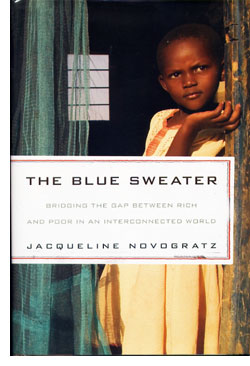 |
 |
 Jacqueline Novogratz
Jacqueline Novogratz
The Blue Sweater: Bridging the Gap Between Rich and Poor in an Interconnected World
Reviewed by: Rick Kleffel © 2011
Rodale / Macmillan
US Hardcover First Edition
ISBN 978-1-594-86915-0
Publication Date: 03-03-2009
262 Pages; $24.95
Date Reviewed: 10-13-2011
Index:
Non-Fiction
The world changes — slowly and swiftly, both at once. Single humans swim upstream against established social and economic systems for years with no obvious effect. Then, in an eye blink, something crashes, something fails and a revolution underway for decades steps up, center stage and perfectly obvious in hindsight. Afterwards, a new order is evident and entrenched. Few remember how we got to where we are.
In the 21st century, micro-financing, pioneered by Muhammad Yunnus is well understood as a means of effecting economic change and empowerment. That was not the case back in 1985, when Jacqueline Novogratz graduated from college and waltzed into a Wall Street career with Chase Manhattan Bank as an international credit analyst. Her journey from ruling the world to saving the world, as chronicled in 'The Blue Sweater: Bridging the Gap Between Rich and Poor in an Interconnected World' is not an easy ride.
Novogratz makes more than a few mistakes that leave both her and the reader uncomfortable. Seemingly good people end up on the wrong side of history. Loose ends never get tied up. It's life, raw and not always pretty. But that makes good reading for those willing to step into the discomfort zone where Western hubris meets the reality of world poverty. It helps greatly that Novogratz manages to discover both within herself and within the world around her an effective means for creating change.
Novogratz's book is a memoir of sorts, covering her early years in Africa, and her return to Rwanda after the genocide. Reader's looking for a "how-to" with regards to her creation of the quite-successful Acumen fund had best look elsewhere. Novogratz keeps her eyes on the grounding experiences she had as a rather green do-gooder and the sobering aftermath of the Rwandan genocide. Because the book is a memoir as opposed to a business plan, it has a more personal feel. Novogratz does not go easy on herself, but she also speaks from a place of hope, not despair. There's a bit of hindsight at work that keeps the book from being maudlin, but sometimes shows the strain around the edges. The plot of Novogratz's life is dramatic enough, but authentically meandering as well.
Novogratz's prose is often beautifully, poetically descriptive. She evokes the exotic settings she finds herself in with ease. When she's in the flow, the book is appropriately immersive. But at other times, she's deliberately prickly. It's clear in her writing that she is not at ease, and her self-examinations are harsh and uncomfortable. It's an effective method of unsympathetic self-characterization, and a bracing counterpoint to the lyrical and inspirational passages.
The real power of 'The Blue Sweater' emerges not in the parts, but in the whole, in Novogratz's effectively communicated vision of how vastly different lifestyles and cultures can collaborate for the betterment of all, even in the face of human-created tragedy. "Betterment" is a dangerous word, one that often suggests what passes for modern steamrollering over what those in the steamrollers try to term primitive. But if you leave those labels behind and hunker down in the fields to talk, if you actually listen, you've made the first and most important connection. In 'The Blue Sweater,' Jacqueline Novogratz reveals ample reasons for hope, for life. They're good reasons to read, as well.
|
 |
|
|
 |
| |
Review Archive
All Reviews alphabetized by author.
General Fiction
Non-Genre, general fiction and literature.
Horror
Supernatural fiction, supernatural horror and non-supernatural horror.
Science Fiction
Science fiction, science fantasy, speculative fiction, alternate history.
Fantasy
Fantasy, surrealism and magic realism.
Mystery
Crime, thrillers, mystery, suspense.
Non-Fiction
Non-Fiction, True Crime, Forteana, Reference.
Poetry
|
|
 |
|




